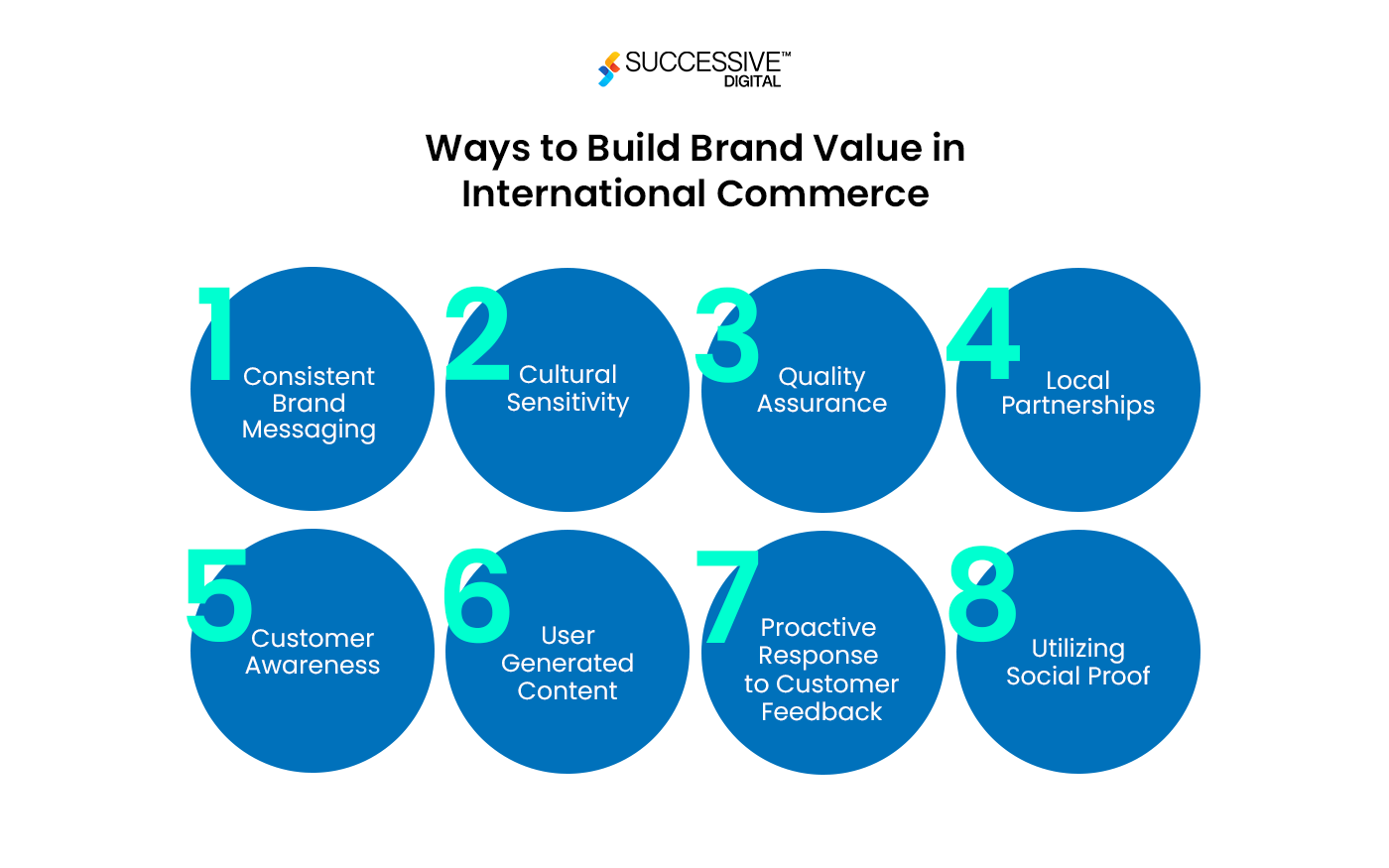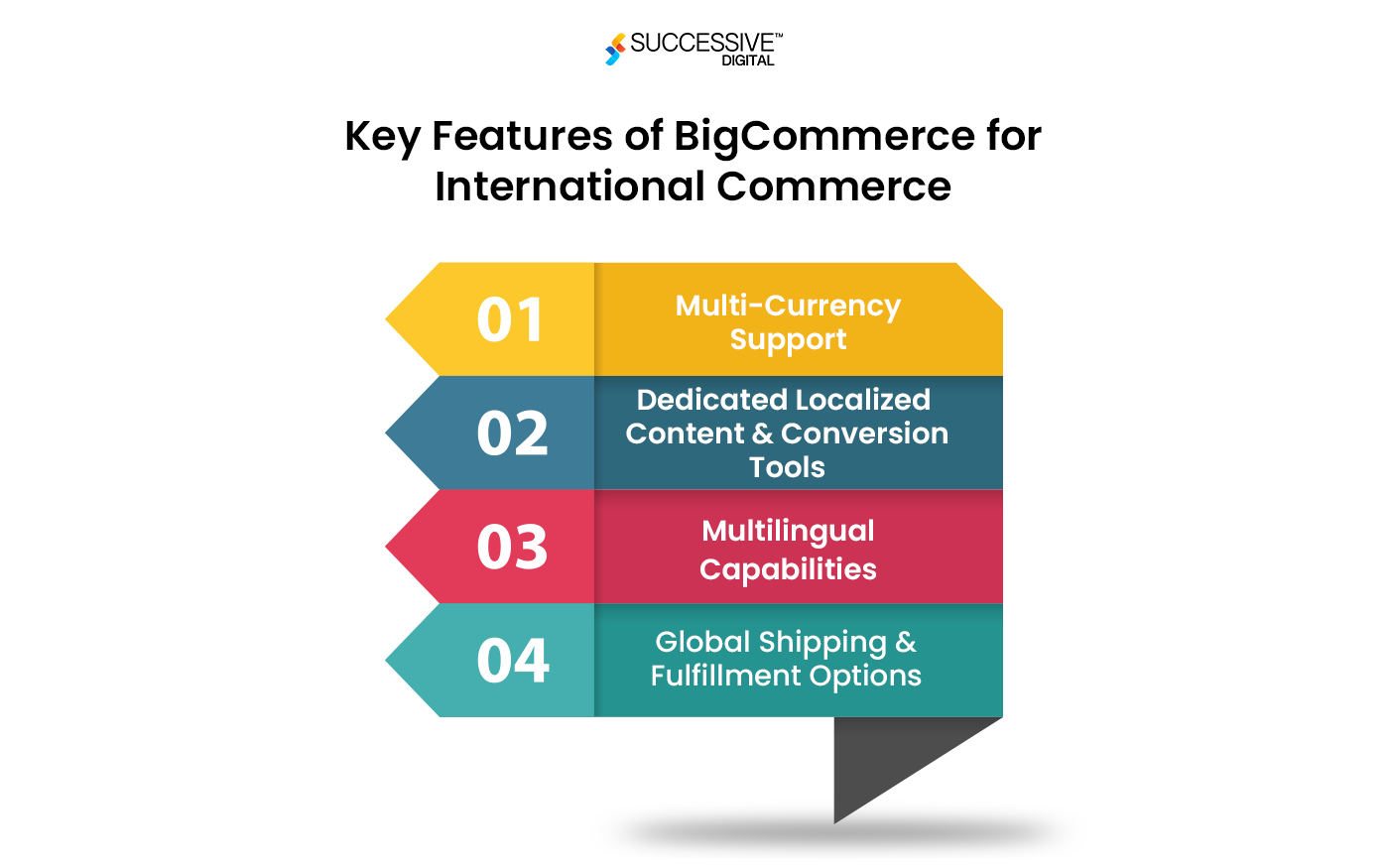In the dynamic landscape of today’s global business environment, the importance of international expansion cannot be overstated. With increasing globalization and interconnected economies due to technological advancements, businesses are presented with various opportunities for growth beyond their domestic boundaries.
Hence, venturing into international commerce becomes a strategic imperative to stay competitive and thrive in the ever-evolving global marketplace. Expanding internationally opens avenues for businesses to tap into new and diverse markets, providing access to a broader customer base and opportunities to increase revenue.
For implementing international expansion, it is important to choose the right eCommerce platform. On that note, BigCommerce stands out as one of the best international eCommerce platforms renowned for its robust and flexible architecture, empowering businesses to expand their online store globally. What sets BigCommerce apart is its user-friendly interface and a suite of features designed to cater to the unique challenges of global commerce. Whether it’s the seamless creation of compelling storefronts or the efficient management of complex inventory structures, BigCommerce provides a comprehensive solution that aligns with the diverse needs of businesses operating on a global scale.
Diving deep into international eCommerce, this blog will unravel BigCommerce’s capabilities, showcasing how it serves as a catalyst for international expansion by streamlining operations and enabling businesses to sell across borders with ease.
Understanding the Global Landscape
In order to understand the ongoing trends of the global landscape and the road to international eCommerce requires thorough market research. Businesses must delve deep into the demographic, psychographic, and behavioral aspects of potential markets. This involves studying consumer behavior, preferences, and purchasing power. By doing so, companies can identify target markets in the global context and align their products or services with the specific needs and desires of the local consumer base.
-
Analyzing Cultural and Economic Factors
Understanding the competitive landscape in potential target markets enables businesses to differentiate themselves and position their offerings effectively.
This research extends beyond simple demographics and rather involves cultural and economic considerations since each country possesses unique cultural norms.
Cultural and economic considerations play a pivotal role in international commerce success. Cultural nuances impact consumer behavior, communication styles, and product preferences. A comprehensive understanding of the cultural landscape helps businesses personalize their push notifications and emailers, product presentations, and overall brand image to resonate effectively with diverse global audiences.
Economic conditions, including income levels, inflation rates, and spending patterns, vary widely across different regions. Analyzing these factors allows businesses to adapt their pricing strategies and product offerings to align with the economic realities of each target market.
-
Legal and Regulatory Considerations
Navigating the complex web of international trade regulations is paramount for a successful global expansion strategy. Businesses must familiarize themselves with the regulatory frameworks of each target market, ensuring compliance with laws governing imports, exports, and trade practices. This includes understanding documentation requirements, product standards, and licensing obligations specific to each jurisdiction.
Incorporating compliance into the expansion strategy not only mitigates legal risks but also fosters trust with local authorities, customers, and partners. Failure to adhere to international trade regulations can result in delays, fines, or even the suspension of operations in a particular market.
Understanding BigCommerce’s Role in Implementing International eCommerce

BigCommerce emerges as a powerful and versatile eCommerce platform, catering to businesses of all sizes seeking to establish and grow their online presence on a global level. Its intuitive interface, scalability, and robust features make it an ideal choice for businesses seeking international expansion. It also offers a user-friendly environment for setting up and managing online stores, providing a seamless experience for both merchants and customers. The BigCommerce development company you hire for building your international eCommerce solutions will utilize the platform’s internationalization features and custom apps to tailor the store based on regional preferences.
Key Features of BigCommerce for International Commerce

-
Multi-Currency Support
BigCommerce’s multi-currency support is a game-changer for businesses operating on a global scale. This feature enables transactions in various currencies, allowing customers from different parts of the world to shop in their local currency. This not only simplifies the purchasing process for customers but also enhances their overall shopping experience, fostering trust and satisfaction. You can also read our blog on How BigCommerce can help in international commerce with multi-storefront capability and understand the global commerce support offered by this platform.
-
Dedicated Localized Content and Conversion Tools
With BigCommerce, you can either use its stencil framework or your preferred CMS to manage and localize your content for regional audiences. This allows your local sales teams to initiate region-specific growth and utilize conversion tools in such a way that works best for particular regions.
-
Multilingual Capabilities
The ability to create multilingual websites is a critical aspect of reaching diverse global audiences. BigCommerce facilitates the development of websites in multiple languages, ensuring that businesses can effectively communicate with and engage customers in their preferred language. This feature goes beyond translation, addressing cultural nuances and creating a more personalized shopping experience for your regional consumers.
-
Global Shipping and Fulfillment Options
Managing international shipping logistics can be complex. Fortunately, with BigCommerce you get robust global shipping and fulfillment options to streamline the process. The platform provides tools to integrate with various shipping carriers, calculate shipping costs, and offer multiple delivery options. This not only ensures a smooth shipping process for merchants but also provides transparency and choice for customers worldwide. By addressing the challenges of international logistics, this platform empowers businesses to expand their reach, deliver products efficiently across regions, and build a strong foundation for international eCommerce.
Optimizing the Online Store for Global Audiences
In the quest for global expansion, optimizing the online store for diverse audiences is paramount. This involves a multifaceted approach to cater to the unique needs and preferences of consumers across different regions. The optimization process can be dissected into the following components.
-
Customizing the User Experience for Different Markets
One of the fundamental aspects of creating a seamless user experience for international customers is addressing language barriers. Offering the website content in the local language not only enhances accessibility but also establishes a deeper connection with the audience in international eCommerce. Understanding the cultural issues associated with language is crucial for creating compelling and relevant content.
Another challenge with international expansion is currency conversion and pricing since every region has a different pricing strategy. BigCommerce’s support in building custom international eCommerce solutions allows businesses with multi-currency functionality. This allows businesses to dynamically display prices in various currencies, creating transparency and minimizing pricing-related confusion. Implementing effective currency conversion strategies, such as real-time rates and clear communication about potential fees, instills confidence in international customers and builds customer loyalty on a global scale.
-
Mobile Optimization for Diverse Audiences
In an era dominated by mobile devices, optimizing the online store for mobile users is not just a preference but a necessity. Mobile optimization goes beyond responsive design; it involves tailoring the user interface to accommodate varying screen sizes, network speeds, and device capabilities. Recognizing the diverse range of devices and network conditions globally is crucial for ensuring a smooth and engaging mobile experience. BigCommerce provides tools and features that enable businesses to create mobile-friendly interfaces, ensuring that customers from different regions can seamlessly navigate through your store via the mobile app.
-
Implementing Localized Marketing Strategies
Understanding the cultural nuances and trends of each target region is essential to map out effective marketing strategies. Localization goes beyond language; it involves tailoring marketing messages, product images, and promotional campaigns to resonate with the values and preferences of the regional audience. This may include adapting advertising content, leveraging regional influencers, and aligning promotional activities with cultural events or holidays. BigCommerce’s flexible platform allows businesses to implement and test various localized marketing strategies, providing valuable insights into what resonates most with different global audiences.
-
Managing International Payments
As businesses expand internationally, it becomes important to integrate safe payment gateways ensuring that customer data and transactions are secured. It is also important to remember that with international eCommerce you need to offer various payment options preferred by global customers, including credit/debit cards, UPI, digital wallets, net banking, etc., ensuring a frictionless payment process for customers worldwide.
Moreover, you must ensure that your international eCommerce solutions provide transparent pricing and keep the purchase process as simplified as possible. Another crucial measure is to avoid payment frauds that are common in international transactions. Here, a trusted partner offering BigCommerce Enterprise eCommerce services can help by integrating security mechanisms within your checkout page.
-
Logistics and Fulfillment
Shipping and order fulfillment, be it for domestic purchases or international, is incomplete without a streamlined logistics system. You must choose reliable shipping partners and consider shipping costs and delivery times to ensure the order fulfillment process is completed within the shortest time possible.
Cost-effective shipping and timely delivery are critical for customer satisfaction and competitive advantage. Here are some measures you can take:
- Negotiate shipping rates with carriers based on shipping volumes, frequency, and long-term commitments to secure favorable terms.
- Utilize strategically located warehouses to reduce shipping distances, minimizing costs and accelerating delivery times.
- Real-time Tracking: Implement real-time tracking systems to provide customers with accurate updates on their shipment’s location and estimated delivery time.
- Shipping Options: Offer a range of shipping options, including standard, express, and economy, allowing customers to choose based on their preferences and budget.
Another component of a successful logistics system is inventory management. Efficient inventory management is crucial for meeting international eCommerce demands while minimizing costs. Best practices for inventory management in the context of international expansion include:
- Centralized Inventory Control: Implement a centralized inventory management system to monitor stock levels across all international locations from a single interface.
- Demand Forecasting: Utilize data analytics and market trends to forecast demand accurately, ensuring optimal stock levels without overstocking or facing shortages.
- Real-time Updates: Integrate systems for real-time updates on inventory levels, helping businesses respond promptly to changes in demand and prevent stockouts.
- Customs Compliance: Stay informed about each country’s customs regulations and requirements to avoid delays and compliance issues related to inventory shipments.
- Safety Stock: Maintain safety stock levels to mitigate unforeseen challenges such as delayed shipments or unexpected spikes in demand.
-
Global Customer Support and Communication
In a diverse global market, language barriers can be a significant challenge. BigCommerce enables businesses to overcome this hurdle by providing multilingual customer support. This involves hiring support personnel fluent in various languages to effectively assist customers from different regions. The platform also supports the integration of translation tools, ensuring that communication is accurate and culturally sensitive.
Moreover, to ensure optimal customer satisfaction, businesses can leverage the latest technologies, such as artificial intelligence (AI). BigCommerce supports the integration of an AI-enabled chatbot feature to enhance customer service on a global scale. Chatbots can provide instant responses to frequently asked questions, offering immediate assistance and improving response times. Additionally, AI-driven analytics can help businesses understand customer behavior and preferences, enabling them to tailor their services more effectively. This not only improves customer satisfaction but also allows businesses to focus on other aspects of their international expansion strategy.
BigCommerce’s APIs and its Advantages for International Commerce
In the realm of international commerce, leveraging BigCommerce’s powerful Application Programming Interfaces (APIs) becomes a strategic advantage for businesses seeking seamless integration and enhanced functionalities. BigCommerce offers three key APIs—Storefront API, Catalog API, and Checkout API—that play pivotal roles in facilitating a smooth international expansion. These APIs also empower businesses to create a tailored shopping experience and efficiently manage products and transactions on a global scale. Let us understand these APIs in detail.
-
Storefront API
BigCommerce’s Storefront API empowers businesses to create a customized and engaging online shopping experience tailored to the preferences and needs of international customers. This API allows for the development of unique storefronts with personalized content, layouts, and features. For international commerce, this means the ability to adapt the online store to different markets, languages, and currencies, ensuring a user-friendly and culture-relevant experience for diverse audiences.
Its advantages include:
- Personalization for Global Audiences: Businesses can dynamically adjust content, pricing, and product recommendations based on the specific preferences and behaviors of users from different regions.
- Multi-Language Support: The Storefront API facilitates the creation of multilingual interfaces, breaking down language barriers and enhancing accessibility for a broader customer base.
-
Catalog API
The Catalog API is a crucial tool for managing product information efficiently across various international markets. This API enables businesses to seamlessly update and synchronize product details, pricing, and availability across different regions. This ensures consistency and accuracy in product information, reducing errors and enhancing the overall shopping experience for customers worldwide.
Its advantages include:
- Efficient Product Management: Businesses can centrally manage their product catalog, making it easier to introduce new products, update pricing, and adjust inventory levels for different international markets.
- Real-time Product Updates: The Catalog API supports real-time synchronization, ensuring that customers across the globe have access to the latest product information and offerings.
-
Checkout API
The Checkout API is instrumental in streamlining the purchasing process for customers, including global customers. It provides businesses with the flexibility to customize the checkout experience to meet unique requirements, such as preferred payment methods in diverse markets. From handling various payment methods to accommodating regional shipping preferences, the Checkout API ensures a seamless and localized transaction process.
Its advantages include:
- Global Payment Options: The API facilitates integration with various secure and region-specific payment gateways, allowing businesses to offer payment options that cater to customers’ preferences in different countries.
- Addressing Regulatory Compliance: The Checkout API assists in navigating the complexities of international trade regulations, ensuring that the checkout process aligns with legal and regulatory requirements in various regions. Don’t forget to check out our dedicated blog on custom checkout solutions and learn the significance of optimizing checkouts for your customers.
Building Brand Value in International Commerce
Building and maintaining a trustworthy brand image in diverse international markets is essential for long-term success. Applying the following strategies within international commerce efforts can help businesses establish credibility and trust.
-
Consistent Brand Messaging
Ensure your brand messaging remains consistent across all international markets. This consistency helps create a unified brand identity that customers can recognize and trust.
-
Cultural Sensitivity
Understand and respect cultural nuances in international eCommerce. Tailor your messaging, visuals, and branding to resonate with the values and preferences of each target audience. This demonstrates cultural awareness and authenticity, contributing to trust.
-
Quality Assurance
Deliver consistent quality in products or services. Meeting or exceeding customer expectations ensures positive experiences, fostering trust and loyalty across diverse markets. With support from an expert eCommerce development company, you can build a quality-approved store that can appeal to international customers.
-
Local Partnerships
Forge partnerships with local influencers, businesses, or organizations. Collaborating with respected entities in specific markets can lend credibility to your brand and enhance trust among local consumers.
-
Customer Awareness
Educate international customers about your brand values, mission, and the uniqueness of your products or services. Providing transparent information helps customers make informed decisions, contributing to trust-building.
-
Encouraging User-Generated Content
Actively encourage customers to share their experiences through reviews, photos, and videos. User-generated content provides authentic perspectives, building trust among potential customers.
-
Proactive Response to Customer Feedback
Demonstrate your commitment to customer satisfaction by responding to both positive and negative reviews and that too in the shortest time possible. You can utilize AI-enabled chat support to address concerns and assist customers of different regions no matter the timezone. Addressing concerns and expressing gratitude for positive feedback shows that you value customer opinions.
-
Utilizing Social Proof
Leverage social media platforms to amplify positive reviews and testimonials. Social proof from satisfied customers can impact purchase decisions, build trust, and persuade customers to buy your product/services.
Implementing Transparent Policies for International Customers
Transparent policies are crucial for building trust with international customers and ensuring a positive customer experience:
-
Open Shipping and Return Policies
To implement transparent policy protocol in your international commerce strategy, clearly communicate shipping times, costs, and return policies for international orders. Providing this information upfront helps manage customer expectations and avoids misunderstandings. You can also read our blog on creating seamless checkout processes with BigCommerce. This will help you understand the role of this robust platform in handling the end-to-end process of checkout and payment processing.
-
Transparent Pricing
Openly display product prices, including any applicable taxes or fees, in the local currency. Ambiguity in pricing can lead to distrust, while transparent pricing fosters a sense of honesty and reliability.
-
Privacy and Data Security
Ensure that your online store outlines your commitment to data privacy and security. International customers often have concerns about sharing personal information, so assuring them of secure transactions can enhance trust.
-
Localized Policies
Tailor policies to align with the legal and cultural norms of specific regions while complying with country-wise regulations. This demonstrates respect for local regulations and enhances trust by showing that your brand adapts to the unique needs of each market in international eCommerce.
Conclusion
The eCommerce industry is openly embracing technological advancements allowing businesses to expand their reach across borders and invest in international commerce strategy. To implement international expansion you require a robust eCommerce platform such as BigCommerce to navigate the complexities of global retail. With this platform, you can customize your online store for diverse audiences, manage payments and logistics, personalize shopping experiences for each regional audience, and boost revenue. So, are you ready to empower your eCommerce business with global commerce enablement? Let our BigCommerce experts at Successive Digital assist you!












